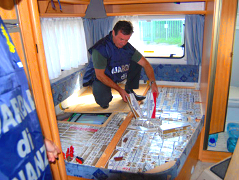Financial Times: Belarus supplies smuggled cigarettes in the UK
19- 18.04.2013, 15:00

UK smokers, fed up with constant price rises, are turning to smuggled and counterfeit tobacco in greater numbers than ever before, according to research.
The number of cigarettes smoked in the UK that have not had duty paid on them leapt nearly two-thirds in 2012, according to a report by KPMG on behalf of Philip Morris International, the tobacco company.
About one in six cigarettes in the UK were either smuggled into the UK or are counterfeit, informed Financial Times.
Last year, Britons smoked 1bn knock-off cigarettes – 49 per cent more than in 2011. The average retail price of a standard packet of 20 cigarettes has risen from £4.50 to nearly £8 over the past ten years. Of the £8, nearly £6.20 is tax, according to the Tobacco Manufacturers’ Association.
Debbie Corris, the owner of Jim Ingram, an independent tobacconist in Whitstable, Kent, says smokers are brazen about asking for counterfeit cigarettes – known as cheap whites. “People will walk in, especially during the summer when the out of town people come in, and ask for cheap whites,” she said.
Counterfeit cigarette brands such as Jin Ling have become near household names among some smokers. “Some people actually think Jin Ling is a [legitimate] brand,” added Ms Corris.
The jump in illicit tobacco consumption comes as the UK government mulls introducing plain packaging legislation, which critics argue would make it even easier for counterfeit cigarette makers to flood the market.
Paul Williams, head of corporate affairs at Japan Tobacco International, whose recent advertising campaign against plain packaging fell foul of the Advertising Standards Agency, said: “Plain packaging proposals will provide a step-by-step guide for the counterfeiting of legitimate products, and make it even less expensive to copy them".
“The biggest winners would be international criminal gangs,” he added.
The rise of illicit cigarettes is a headache for the exchequer, which earns almost £10bn per year from duties on tobacco – which increased 5 per cent in the most recent Budget. The exchequer loses about £1.2bn per year in duty, according to HMRC.
The trade in counterfeit cigarettes also hits newsagents, who lose both revenues from tobacco sales and customers in general.
In his shop in Glasgow’s West End, tobacconist Geoff Barrett does a roaring trade in cigarette filters, cigarette papers and lighters – but not tobacco. “We don’t sell as much rolling tobacco as we used to, but we sell the same amount of cigarette papers,” he said.
“There’s a 30 odd per cent gap in terms of the numbers of cigarette papers to the actual tobacco we sell. Before, that never happened.
“It hurts us because it’s a key driver of footfall,” said Mr Barrett, who is also a spokesman for the Tobacco Retailers’ Alliance, a lobby group.
Even the large tobacco companies are feeling the pain. Imperial Tobacco, the world’s fourth largest tobacco manufacturer, blamed the rise of illicit tobacco sales for their recent slump in sales.
A typical pack of 20 cigarettes retails for €9.40 in Dublin while a packet sold on the black market costs less than half that. A packet of so called “cheap whites”, brands that are not registered for sale the EU, can be bought by criminal gangs for as little as 30 cents from factories in countries such as Belarus, Ukraine and China.
A report published this week by JTI Ireland, a Japan Tobacco Group company, shows 28 per cent of all cigarettes consumed in Ireland last year were illicit sales that evaded excise duty, up from 26 per cent in 2011.
“Irish criminal gangs are making about €3m a week in selling illegal cigarettes,” says Frank Gleeson, chairman of Retail Ireland, an organisation representing shop owners.
Ireland often acts as a gateway into the larger UK marketplace. For example in 2009 customs authorities intercepted a consignment of 119m illicit cigarettes in Co Louth, Ireland – one of the largest hauls ever recorded in Europe.
Smugglers regularly change their tactics to avoid detection. A few years ago large amounts of counterfeit cigarettes were imported from factories in China into Europe. Containers were landed in big ports such as Antwerp and distributed around Europe in smaller loads. Chinese contraband cigarettes are typically very low quality and contain higher amounts of toxic substances than regular cigarettes.
Cigarette factories in Belarus and Ukraine have also been pinpointed by customs officials as selling to criminal gangs, who smuggle them into the EU. Greece has become a popular route for tobacco smugglers recently as its borders are porous because of the economic crisis and the near collapse of its customs authorities.
Some illicit cigarettes originate in EU countries such as Cyprus and Italy. In these cases the smugglers typically ship the cigarettes to the Middle East, north Africa or even Asia before bringing it back into the EU and evading duty.
A significant amount of illicit cigarette smuggling involves so called “ant smuggling”, whereby individuals, typically from countries where prices are low such as eastern Europe, fly into the UK and Ireland with suitcases containing several thousand cigarettes. Often several smugglers can fly into the UK or Ireland on a single flight.
Penalties for cigarette smuggling are much lower than for drugs smuggling, which carries mandatory minimum sentences of up to 10 years in Ireland. This means criminal gangs can generate tens of millions of euro a year in revenues while facing only the threat of fines or a short prison sentence.








